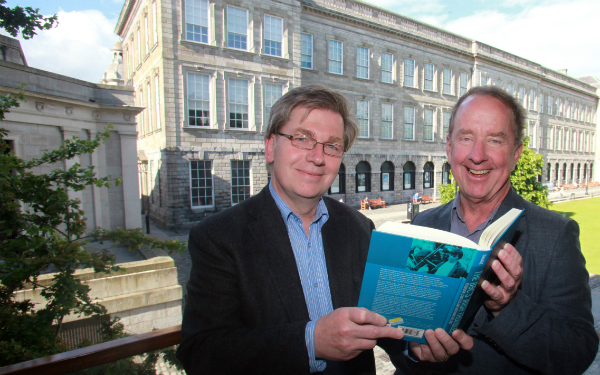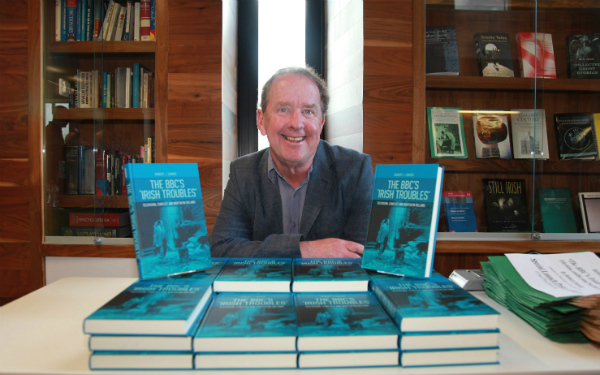Book Focuses on Television Propaganda Wars During ‘Troubles’
Posted on: 02 June 2015
The BBC’s struggle to maintain independence and journalistic credibility during the propaganda war of Northern Ireland’s ‘Troubles’ is the subject of a new book which was launched in Trinity College Dublin.
The BBC’s ‘Irish Troubles’ Television, Conflict and Northern Ireland, by Robert Savage, Professor of the Practice of History at Boston College, uses recently released archival material from the BBC and a variety of UK government archives to explore the contentious relationship between broadcasting officials, politicians, the army, police and civil service from the outbreak of violence through to the 1980s.
Professor Savage completed the new publication while a visiting research fellow at the Trinity Long Room Hub Arts & Humanities Research Institute in Trinity College Dublin. The book was launched in Trinity Long Room Hub on Friday, May 29th, 2015.

Focusing on the incessant wrangling between political elites, civil servants, military officials, broadcasting authorities and journalists about what should and should not be featured on the BBC's regional and national networks, Professor Savage considers how the BBC’s broadcasts complicated the ‘Troubles' by challenging decisions, policies and tactics developed by governments trying to defeat a stubborn insurgency that threatened national security.
In many cases the anxiety and controversy created by these political skirmishes challenged the ability of the medium to accurately inform citizens of important events taking place, thereby undermining the BBC's role as a public service provider, according to Professor Savage.
The book, published by Manchester University Press, illustrates that as the ‘Troubles’ escalated, the BBC was attacked, threatened and bullied, by a variety of actors but did its best to stand its ground and maintain editorial independence and journalistic credibility.
Key Points:
- In spite of the infamous broadcasting restrictions put in place in 1988, professional staff remained determined to provide the public with informed news and information about the conflict. Broadcasters resisted government efforts to silence voices that, although controversial, were critical to comprehending and eventually resolving a long and bloody conflict. The broadcasting ban was seen as despotic by many broadcasters who, with the support of senior staff, cleverly worked around it by using sub-titles and then hiring actors to read the words of Sinn Féin politicians. Reporting on ‘the Troubles’ became somewhat surreal as talented actors including Stephen Rea and Ian McElhinney found work dubbing the remarks of Gerry Adams and Martin McGuinness.
- The BBC in Northern Ireland slowly evolved to become more independent and less deferential to the Unionist Government at Stormont. By the late 1960s its managers and editors understood the need for an independent editorial posture and became more critical of the politics, policies and pronouncements of the Unionist Government.
- Labour and Conservative Governments alike tried to pressure, censor and bully the BBC both in Belfast and London. These governments were convinced that the BBC coverage of the turmoil in Northern Ireland undermined their efforts to defeat terrorism. These governments were acutely aware of the power of television to damage the image of the United Kingdom at home and abroad and struggled to succeed in winning the ‘propaganda war’.
- The national network knew little about the complexities of Northern Ireland until the beginning of the campaign for civil rights began to gain traction in the province. By providing informed, critical coverage of events the BBC helped undermine a regional parliament that had long governed without consensus.

Professor Savage commented: “Throughout the conflict British governments tried to shape the way in which television depicted the struggle against paramilitaries, especially the Provisional IRA. However, its relentless presence undermined government efforts to present a simple picture of the forces of law and order trying to defeat savage terrorists hell-bent on a campaign of murder and mayhem. All those involved in the conflict hoped to produce a narrative for both domestic and international audiences to justify their role in an increasingly bitter and violent struggle.”
“The propaganda war that ensued created much consternation for officials in London, Belfast, and Dublin who understood the conflict presented a real and immediate threat to social order. Rules, regulations and policies that tried to suppress, shape or ‘spin’ coverage of the conflict were intended to marginalise extremists. Governments were acutely aware of the power of television to encourage sympathy or support for the very organisations they sought to destroy.”
Professor Jürgen Barkoff, Director of Trinity Long Room Hub Arts & Humanities Research Institute commented: “The Trinity Long Room Hub is proud to have supported, through its Visiting research Fellows programme, such a groundbreaking book. Professor Savage’s stay at the research institute was an enriching and highly stimulating experience for everyone involved and we are particularly pleased that new collaborations developed out his time with us such as the special edition of the journal Éire/Ireland, co-edited with Professor Christopher Morash from the School of English.”
Media Coverage:
- Today With Sean O’Rourke, RTE Radio 1, Friday, May 29th, 2015
- The Right Hook, Newstalk, Friday, May 29th, 2015
- IrishTimes.com, Thursday, May 28th, 2015
- Sunday Times, 5th May, 2015
About Robert Savage:
Robert Savage is Professor of the Practice of History at Boston College. He completed his latest publication while a Visiting Research Fellow at the Trinity Long Room Hub in 2012. Other publications include A Loss of Innocence? Television and Irish Society 1960-1972
(2010), Sean Lemass: a biography (1999 revised and expanded edition 2014), Irish Television: the Political and Social Origins (1996). He is currently co-editing a special edition of the journal Éire/Ireland with Christopher Morash, Seamus Heaney Professor of Irish
